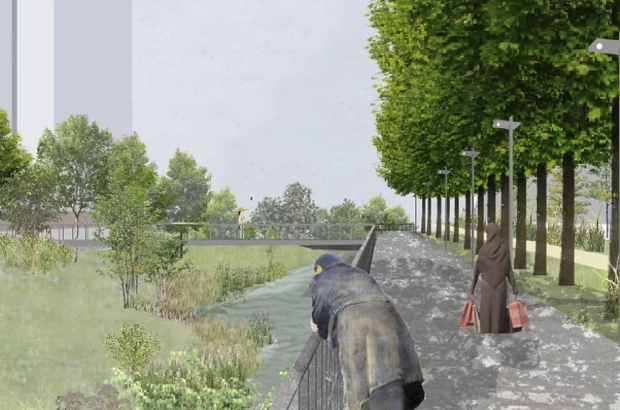- Daily & Weekly newsletters
- Buy & download The Bulletin
- Comment on our articles
Open River Senne in new park project won't smell, assures minister
The river Senne, which will be opened over a distance of 700 meters in the new Maximilian Park in Brussels from 2026, will have a siphon, a bit like a toilet u-bend, to prevent unpleasant smells escaping, reports Bruzz.
The issue was brought up during an Environment committee meeting on Wednesday where the progress on plans for the new park was discussed and addressed by minister of environment Alain Maron.
Maron was answering questions on the reopening of the buried river from Brussels MP Geoffroy Coomans de Brachène who wanted to know the state of affairs of the Max-Sur-Senne project, the planned renewed Maximilian Park along an open Senne. Coomans de Brachène was specifically worried about possible smells coming off the water.
"The water quality of the Senne has improved considerably, partly due to the opening of two water treatment plants in 2000 and 2007," said Maron. "As a result, life in and around the water is possible again. The opened Senne will be able to accommodate more biodiversity."
As a result, the water will normally not stink, Maron told the committee. "But the air from the tube from which the Senne flows can come out of the storm basins that have absorbed water from the sewers in the event of heavy rainfall. That's why the installations with which the Senne will be opened will have a kind of gooseneck (siphon), a bit like a toilet in a house."
But in order to guarantee water quality even on particularly rainy days with an overflow from the sewers, when excess sewage has to be discharged to watercourses, the current underground tube of the Senne will be retained, Maron said. "This gives us the opportunity to temporarily keep the river out of the park during periods when the water quality is poor."
The Senne is about 100 kms long, with about 15 kms in the urban area of Brussels, two-thirds of which are enclosed in concrete formwork.
In the centre of Brussels, the Senne was completely covered up and major boulevards were built over the top of it in the 19th and early 20th centuries. The river is still visible on the outskirts of Brussels and outside the city, although within the city it now runs mostly underneath the inner ring road.
The Senne was notorious for being one of Belgium's worst polluted rivers, since all effluents from the Brussels Capital Region emptied into it without treatment. Over the last 20 or so years, the completion of new sewage treatment plants have led to the quality of the water in the river improving.
Speaking more generally on the overall state of the project, Maron said that the permit dossier was as good as ready and would soon be submitted. Since March, the engineering offices involved have been working on the specifications for the project. The contractors who will carry out the works must be designated by November 2023 at the latest. The end of the construction phase is planned for June 2026.
The Senne, which will be opened over a distance of 700 m through the park, will have asymmetrical banks. For example, no pumps or other devices should be used to bring the Senne back up from the subsurface, a non-natural intervention that would be harmful to life in the water. Thus, one of the two banks will be vertical, the other gently sloping and accessible.
Part of the Senne banks will not be publicly accessible, the same for other areas in the park. The region wants to keep about 30% of the space in the new park reserved for biodiversity. This should strengthen the so-called blue and green networks in the inner-city zone.
A budget of €25 million has been earmarked for the project, which will be funded by Brussels Environment, the City of Brussels and Brussels Mobility.
The popular petting zoo of the Maximilian Park will be moved to a new, quieter place near the WTC towers and the social housing nearby.
The new park will also have fewer dark corners and more open and secure spaces, Maron said. "This will reduce the feeling of insecurity and improve social control,” he said. “In addition, a maintenance team will be present in the park."














